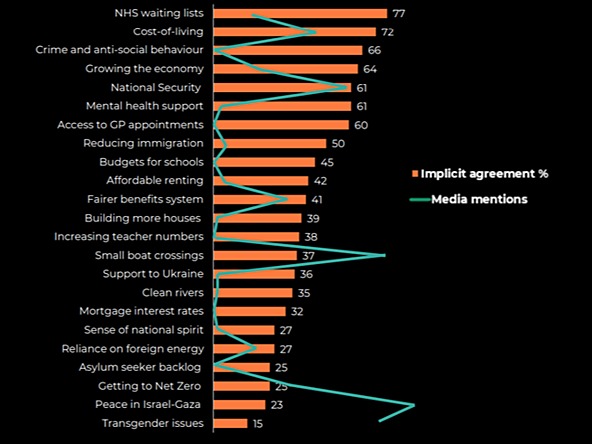OPINION22 August 2024
All MRS websites use cookies to help us improve our services. Any data collected is anonymised. If you continue using this site without accepting cookies you may experience some performance issues. Read about our cookies here.
OPINION22 August 2024
Topics that trend online often do not reflect the issues of most importance to the general public. An Unlimited study examined the reasons behind the disconnect.

Did you know that over three-quarters of the UK population felt strongly it was important to reduce NHS waiting lists in the run up to the election? That’s probably not a surprise to you. It is more likely than not that you felt the same.
What you might find surprising is that talk of reducing NHS waiting lists in online media conversation was really limited during this time, when compared to the airtime that other topics received. For instance, online mentions of the situation in Israel and Gaza and transgender debates were much more prominent, despite the UK electorate as a whole feeling far less emotionally driven by these topics.
These results were gathered by Unlimited, which carried out reaction time testing among a nationally representative sample of 2,000 respondents between 6th and 10th June 2024. Media monitoring for keyword mentions of issues was then carried out across the period 1st January to 20th June 2024. In-depth interviews also took place in June with five respondents ranging in age, geographical region and financial attitudes.

Such a gap in importance versus conversation has the potential to leave people feeling disconnected and misunderstood and, with the 2024 general election seeing the lowest voter since 2001, this should be a cause for concern.
Why do topics closest to our hearts get overshadowed online?
Content to drive debate
One component drawing the overshadowed issues together is their broadly personal and tangible nature. The NHS, cost-of-living, crime and the economy impact everyday lives across the UK in a big way. The fact that such a marked majority agree on their importance inevitably reduces the extent to which they are debatable and controversial, avenues that online media conversation excels in. People want to write and share content that will be engaged with.
The online environment provides the perfect environment for debate. It is easy to find large numbers of others with very similar views on controversial topics and likewise, large numbers of people with very differing views, sparking debate.
Indeed, we found topics that are more contentious, with strong opinions either way, sparked most online conversation despite being of lesser emotional importance to the UK as a whole: namely, small boat crossings, Israel-Gaza and transgender debates including single-sex spaces. These are also all comparatively ‘newer’ conversations in which a consensus is yet to be reached.
Tendency to consume, with topics set by content creators
It is likely most people consume news online in the UK, yet a comparatively small proportion post content. And some who post content do so a lot. Is this misleading for online media as a whole? Probably. Journalists, politicians and content creators may feel they are doing their background research, and it is returning a skewed picture as to what really matters to people. The UK public then see these issues discussed online and they are more top of mind, further increasing their visibility, but potentially increasing a feeling of disconnect.
Perhaps some issues are felt by content creators to be already well covered. Indeed, many weighty and important social issues – mental health support, GP appointments, schools, rent, housing – were barely touched on in online conversations in comparison to those mentioned above. By only paying attention to the online media environment, these could be deemed (incorrectly) as less important to people.
How do we avoid the trap?
This finding reinforces the criticality of understanding people and their emotions at the heart of it. Yes, what is talked about online can play a role in this, and it can be a crucial part of the puzzle in understanding certain opinions and what messaging the public is exposed to. However, it misses the picture of what is closest to the hearts of the public. Reaction time testing, with other behavioural science research approaches, can be key to redress the balance.
This is not to say that issues deemed as less emotionally important to the broad population are not important to discuss, of course they are. It is a reminder that what we read online is a sense of what is ‘out there’ for people to see, not necessarily a sense of what is ‘in there’ and people feel. We would all do well to remember this.
Claire Morris is research director at Unlimited
0 Comments